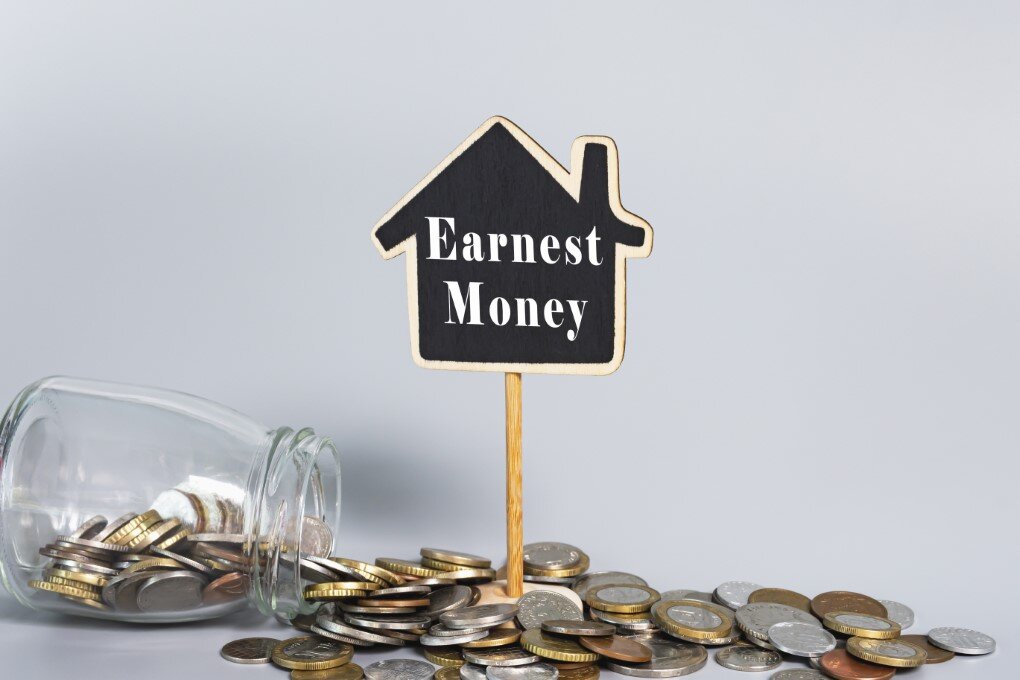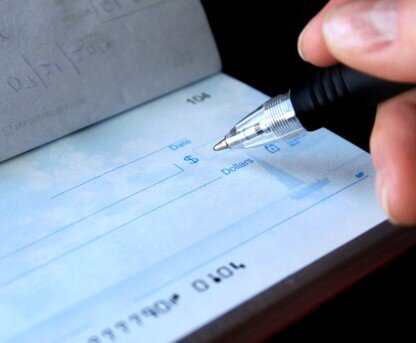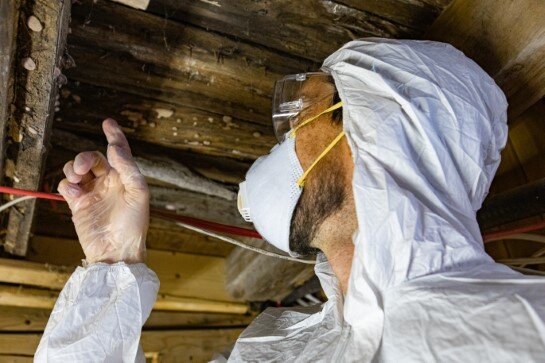
Earnest money is a common term amongst real estate professionals, but there can be quite a bit of confusion surrounding it for people who don’t deal with real estate transactions every day.
Many people have questions such as, “Is earnest money refundable?” “How much is enough?” Or, “Does earnest money go toward the down payment?”
The good news is that most information about earnest money deposits is pretty straightforward. We’ve broken down the answers to these questions and many more in this article so you can clearly understand what earnest money is and what it is used for.
After reading this article, you will understand the terminology surrounding earnest money and be able to talk about it clearly when the topic comes up. That is important whether you are selling your house, buying your next home, or just talking amongst friends.
Let’s dig in!
What is Earnest Money?
In real estate, earnest money is a deposit given by the buyer along with the signed purchase contract to show that they are acting in good faith and genuinely intend to follow through with the house purchase. If the buyer backs out of the deal for any reason outside of the contingencies in the purchase agreement, they forfeit their earnest money deposit.
This gives a financial incentive for the buyer to honor the contract. As you can imagine, a larger earnest money deposit results in a stronger offer because the seller is more protected, and the buyer is more motivated to make the deal go through.
Earnest money, also known as a good faith deposit, is a necessary component of real estate transactions because, without it, people could put houses under contract with no intention of buying them. A reasonable earnest money deposit compensates the seller for the time they spent taking the property off the market and turning away any other potential buyers.

How Do I Give Earnest Money?
Earnest money is typically given in the form of a check. For smaller deposits, a personal check is usually acceptable. For larger deposits over a few thousand dollars, most title companies require a certified check.
When is Earnest Money Given?
The earnest money deposit should be made once the purchase agreement is signed. Otherwise, the agreement is not as easily enforceable. If you are selling a house, ensure the buyer deposits the money as soon as possible.
Who Holds the Earnest Money?
Earnest money is always held in an escrow account by the title company handling the transaction. Since they are a neutral third party and well-versed in real estate law, they are the most qualified to hold the money and disperse it to the appropriate party if necessary. In many retail transactions where the buyer is purchasing the house to live in, they will give it to their real estate agent to deliver to the title company.
Earnest money should never be given directly to the seller. Otherwise, it might be challenging to get it back if the deal falls through.
Who Do I Make Earnest Money Check Out To?
The earnest money check is almost always written to the title company handling the transaction.
Does Earnest Money Go Towards Down Payment or Closing Costs?
The good news if you’re a buyer is that your earnest money actually goes toward purchasing the house. It gets mixed into the pot of the entire transaction and goes toward the total dollar amount you need to bring to the closing table.
Every real estate transaction requires a specific dollar amount the buyer must bring to closing to purchase the house. For a buyer getting a mortgage loan, the amount they must bring is the down payment plus closing costs. The earnest money deposit they already made goes toward that total and lowers their “cash to close” number.
Here’s an example: Suppose you’re buying a house and putting $60,000 down, and let’s assume you’re responsible for closing costs totaling $5,000. If you gave $3,000 of earnest money, you would need to bring in an additional $62,000 at the time of closing. The title company will call the $62,000 your “cash to close.”
As you can see, the money required from you at closing gets jumbled together into one number, and your earnest money goes toward that number. So whether you say it goes toward the down payment or closing costs, it really comes out in the wash.
How Much Earnest Money is Enough?
As we mentioned earlier, a higher amount of earnest money makes your offer stronger. But what is the right amount of earnest money to give?

That depends on what market you’re in and the status of the local market. In hot real estate markets, it might make sense to offer more earnest money to make your offer stand out. In a buyer’s market, the seller likely won’t pay as much attention to how much earnest money you’re giving.
Your local market will significantly affect how much earnest money is reasonable. For example, we buy houses in Huntsville AL, and the standard amount of earnest money here is $1,000. However, in other parts of the country, buyers are expected to deposit 1-3% of the purchase price.
It is best to talk to your real estate agent and get their advice on the standard amount of earnest money in your market.
Is Earnest Money Refundable?
Earnest money is refundable until it’s not. Nearly every real estate purchase contract contains contingencies allowing the buyer to back out of the deal if certain criteria are unmet. If the buyer backs out because of one of their contingencies, they typically get to keep their earnest money. But if they back out for any other reason, they forfeit their earnest money, and it is the seller’s to keep.
That is why it is important to use the right contingencies when buying a house and look at the ones included in each offer you receive when selling. Contingencies can affect the competitiveness of an offer just as much as the home’s purchase price – or even more in some cases.
Here are the most common contingencies used in real estate contracts:
Inspection Contingency

This is the most common contingency in real estate contracts – and the most common cause for deals falling apart. A standard inspection contingency gives the buyer a certain amount of time to perform their due diligence and inspect the house for defects.
Most buyers hire a professional home inspector to inspect the house for them. The inspector then generates a report showing the issues they found. The buyer can then decide how to proceed. Depending on the severity of the issues in the report, the buyer can either back out, continue and buy the house as is, or submit a request for repairs to the seller. The last option is the most common.
If the buyer submits a request for repairs, they and the seller negotiate on it until they converge on a compromised list that everyone is happy with. If the seller is unwilling to make repairs and an agreement cannot be met, the buyer has the right to back out and retain their earnest money.
Appraisal Contingency
Another common contingency within real estate contracts is the appraisal contingency. This contingency states that the house must appraise at or above a specific dollar amount. This is most common among buyers who borrow money from a mortgage lender because the lender always hires an appraiser to estimate how much the house is worth.
Most buyers specify that the home must appraise for at least the purchase price, but that is not always the case. In hotter markets, buyers are sometimes willing to cover an appraisal gap up to a certain amount.
If the appraised value comes back lower than the number stated in the contingency, the parties can either renegotiate the purchase price or cancel the contract. If they decide to cancel it, the buyer will be refunded their earnest money.
Financing Contingency
Any buyer that intends to get bank financing to purchase a house will include a financing contingency in the purchase agreement. This states that the purchase is contingent upon their ability to obtain financing.
Buyers are expected to obtain a pre-approval letter from their lender before making an offer on a house. Still, mortgage lenders typically don’t put as much rigor into pre-approving a buyer as they do the formal underwriting process.
If something comes up during underwriting and the buyer cannot qualify for a loan, they can cancel the contract and receive their earnest money back. That is one of the benefits of cash offers because they don’t include a financing contingency.
How Do You Lose Earnest Money?
If you are under contract to purchase a house and back out of the deal for any reason other than one of the contingencies in the agreement, you must forfeit your earnest money to the seller. That is the seller’s compensation for the time they took the house off the market.
This is why it is important to only make an offer on a house you are certain you want to buy and have the proper contingencies in place to protect your interests.
Final Thoughts on Earnest Money
Earnest money is a necessary part of the real estate industry because it keeps buyers accountable. Without it, it would be nearly impossible to tell who the real buyers were, and almost every deal would fall apart with no repercussions.
We hope the information here has shed some light on what earnest money is and the logistics surrounding it. With the proper education, you can make much more informed decisions when it’s time to buy or sell a house. And who knows, maybe next time you discuss it with your real estate agent, you can impress them with your knowledge!
